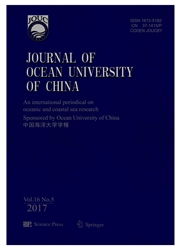

 中文摘要:
中文摘要:
A new extracellular κ-carrageenase, namely CgkP, 34.0 kDa in molecular weight, was purified from Pseudoalteromonas sp. QY203. CgkP showed relatively high activity at acidities ranging from pH6.0 to pH9.0 and temperatures ranging from 30℃ to 50℃ with the highest activity at 45℃ and pH7.2. Sodium chloride increased its activity markedly, and KCl increased its activity slightly. The divalent and trivalent metal ions including Cu2+ , Ni2+ , Zn2+ , Mn2+ , Al3+ and Fe3+ significantly inhibited its activity, while Mg2+ did not. CgkP remained 70% of original activity after being incubated at 40℃ for 48 h, and remained 80% of the activity after being incubated at 45℃ for 1 h. It exhibited endo-κ-carrageenase activity, mainly depolymerizing the κ-carrageenan into disaccharide and tetrasaccharide. CgkP was more thermostable than most of previously reported κ-carrageenases with a potential of being used in industry.
 英文摘要:
英文摘要:
A new extracellular κ-carrageenase, namely CgkP, 34.0 kDa in molecular weight, was purified from Pseudoalteromonas sp. QY203. CgkP showed relatively high activity at acidities ranging from pH6.0 to pH9.0 and temperatures ranging from 30℃ to 50℃ with the highest activity at 45℃ and pH7.2. Sodium chloride increased its activity markedly, and KC1 increased its activity slightly. The divalent and trivalent metal ions including Cu^2+, Ni^2+, Zn^2+, Mn^2+, Al^3+ and Fe^3+ significantly inhibited its activity, while Mg^2+ did not. CgkP remained 70% of original activity after being incubated at 40℃ for 48h, and remained 80% of the activity after being incubated at 45℃ for 1 h. It exhibited endo-κ-carrageenase activity, mainly depolymerizing the κ-carrageenan into disaccharide and tetrasaccharide. CgkP was more thermostable than most of previously reported κ-carrageenases with a potential of being used in industry.
 同期刊论文项目
同期刊论文项目
 同项目期刊论文
同项目期刊论文
 Purification and characterization of a new thermostable kappa-carrageenase from the marine bacterium
Purification and characterization of a new thermostable kappa-carrageenase from the marine bacterium 期刊信息
期刊信息
